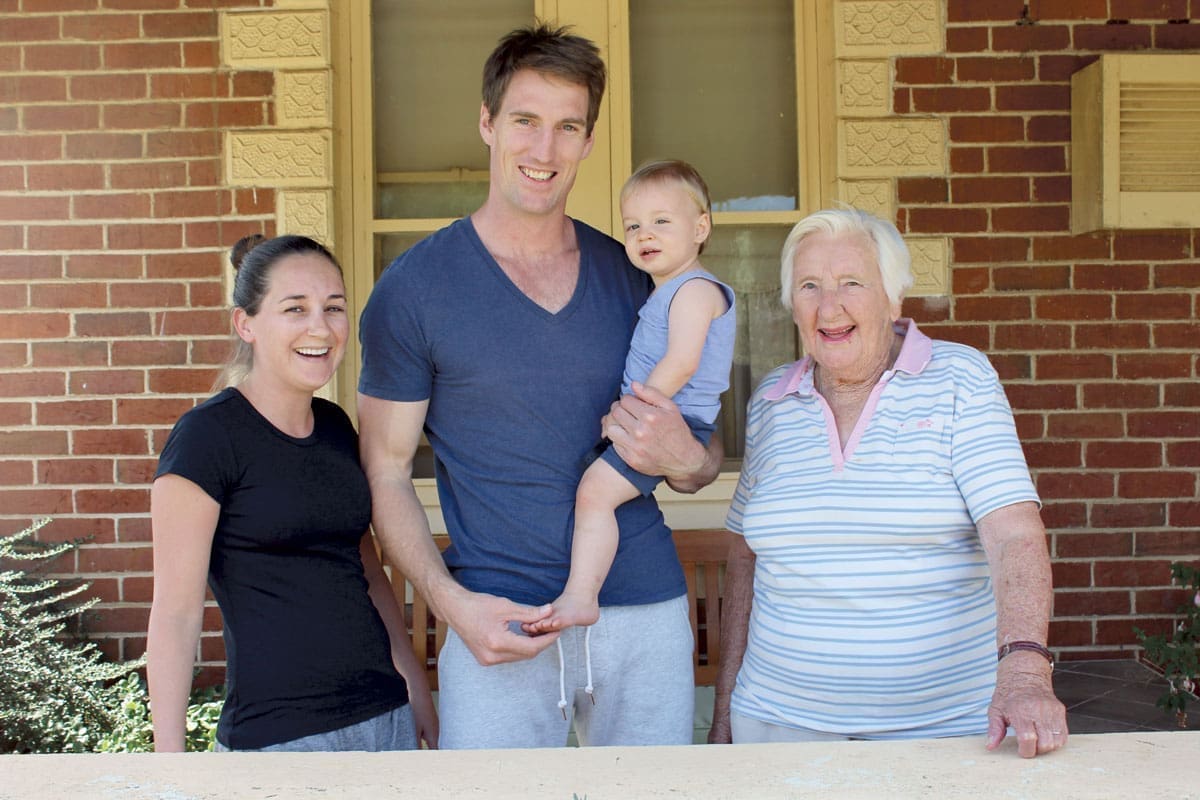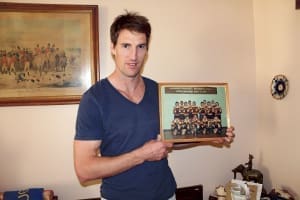Natalie, Sam, Hardy and Mary. Sam with a photograph with his father and uncle in it from a Cootamundra Premiership side.
Harden Murrumburrah lays claim to plenty of talented people. None more talented in his field than Sam Norton-Knight. Sam is the son of Peter & Annie, and the grandson of Mary Norton-Knight of Swift Street, Harden. Sam has spent the last few years playing Rugby Union in Japan after starting his senior career at the Royals Club in Canberra as a 19-year-old. He has now played professionaly all over the world in a career which spans 13 years. Sam and his partner Natalie have recently purchased a home in Canberra and say that next year may be the year they return to Australia with their 16-month-old son Hardy. Sam said, “I fell in to a career as a rugby player. After I finished school I had a gap year before moving to Canberra to study. I played rugby just to meet people and it went from there. “I was lucky I got a university degree, lived overseas and got to live life. Nowadays players can be signed by the time they are 14 and they lack some of the skills required to handle professional sport.”
Sam went through the rugby development system in the ACT, playing for the Brumbies Academy ACT Under 19s after commencing his career with Royals. He also played for the Tuggeranong Vikings, Brumbies Runners and finally, the ACT Brumbies. Sam also went on to play for the Waratahs before a stint in Cardiff for a year before heading to Japan to play for Panasonic. Sam has obviously enjoyed his rugby in Japan, and has stayed there for the last 7 years. “In Japan, I played for 4 teams with 3 years at Panasonic. I spent a year with the Western Force in Super Rugby before returning to play for Kubota.” Sam said a lot of the companies compete in volleyball, basketball and rugby. “I think they do it to boost worker moral and its a way for them to give their workers a team to follow. It builds pride in the company they work for. They spend a lot of money – they have to pay $200,000 to be a part of Japan Rugby. Each side can recruit 5 overseas players but only 2 can take the field at any time.” Recruiting top line players isn’t always a successful formula. “One team this year was relegated and they signed 3 starting Springbok players and had two other internationals on their books,” he said.
“Soccer in Japan took off in the mid 90s and now its rugby‘s turn. After their performance at the world cup, everyone has jumped on the banwagon,” said Sam. “The difference with the Japanese is that they stay on the bandwagon. They are not like Wallaby supporters who can go up and down with enthusiasm.” The Super Rugby competition this year will feature a Japanese side in addition to an Argentinean one, with most players in the Japanese competition being asked to play. But Sam himself is not keen on the idea of the Japanese competition being in some way involved with Super Rugby. “That isn’t why you go overseas. It’s not to play Super Rugby. Playing rugby in Japan is very different to playing Super Rugby,” he said. “It’s just relentless. There are not a lot of weaknesses in sides. I think you have to be pretty ambitious to play Super Rugby.” Sam came back to Australia in 2013 for a stint with the Western Force. Although he handled the intensity, he said that it became difficult to get ‘up’ week after week. Sam played two matches for the Wallabies in 2007. “It was different, it certainly wasn’t as enjoyable as playing Super Rugby, I never felt comfortable in the environment and I spent 2 seasons with the Wallabies.” Part of Sam’s success is that he has never felt rugby is a job for him. “I have never seen it as a job, it’s only felt like a job for a few months in those 13 years playing professionally. I remember in an Australia A game looking out a window on the bus thinking wouldn’t it be nice to be playing footy in that stadium.”
Sam turned 32 in December 2015 and said his lower back is causing him some issues and that it’s probably just genetic. “Dad’s lower back has packed it in and mum’s isn’t much better.” Although he may be a little battered and bruised after 13 years of professional rugby, he is in pretty good shape. His Japanese has improved over time and if the conversation has rugby or food involved he feels pretty safe that he can hold his own. Sam likes the Japanese food which rivals the cooking dished up at Mary’s. Sam said, “The town of Harden changes. The main street is amazing and Newson Park is fantastic for Hardy. There wouldn’t be a year I haven’t come back to Harden a couple of times.” His parents currently live on the Gold Coast and Sam and his father still talk rugby. Peter won a premiership with Cootamundra, with Sam’s cousin playing in the next grand final win 30 years later. Sam said, “We like Canberra and we have friends there from my time at Royals. It will be a good place to bring up the young fella and its close to Mary. I couldn’t live in Sydney. I’m studying Secondary Eductaion Training and I will finish that off full-time when we return.” If the Harden Red Devils’ players are hoping of a return to Harden and a spot in the Red Devils line up, they will be disappointed. “I don’t think I could play for the Devils, country footy is a bit rough for a skinny bloke like me.” he joked.


